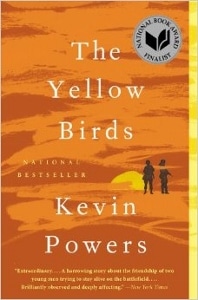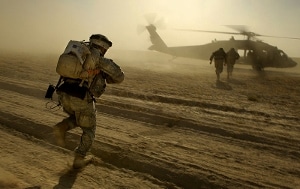All Quiet in Northern Iraq…
Author: Kevin Powers
 I’ve never fought in a war. So I can’t claim to know what it’s like. I’ve also never been to the desert wastes of Iraq. So I don’t know what they’re like, either. When it comes to wars and the foreign lands that host them, most of us have to rely on the testimony of others to try and get a reliable picture of reality. But Kevin Powers has been to war, serving in the US Army in Iraq in 2004 and 2005. So while he’s just one man, he knows more than most people might ever know about these topics – and he clearly has a lot to say about them. In 2012, he published The Yellow Birds, a fictional account of one man’s life and death struggles in the Iraq War.
I’ve never fought in a war. So I can’t claim to know what it’s like. I’ve also never been to the desert wastes of Iraq. So I don’t know what they’re like, either. When it comes to wars and the foreign lands that host them, most of us have to rely on the testimony of others to try and get a reliable picture of reality. But Kevin Powers has been to war, serving in the US Army in Iraq in 2004 and 2005. So while he’s just one man, he knows more than most people might ever know about these topics – and he clearly has a lot to say about them. In 2012, he published The Yellow Birds, a fictional account of one man’s life and death struggles in the Iraq War.
Our narrator is twenty-one year-old Private John Bartle, who tells of the fighting for the city of Al Tafar in northern Iraq in the fall of 2004. He and 18 year-old Private Murphy have been close companions since they completed training at Fort Dix the previous year. Several months of active duty in the deserts of Iraq have made them acutely aware of dangers they face and the considerable chance they both won’t manage to make it out alive. (Ever since Bartle met Murphy’s mother shortly before their deployment and vowed to protect her son from harm, he’s viewed his friend’s safety as his main priority. Sadly, it’s clear early on in the book that Bartle’s best efforts will eventually be for naught.) Despite his promises, the ferocious battles and horrific conditions take their toll and Murphy succumbs to the harsh reality of war. The rest of the book is devoted to revealing the mysteries behind Murphy’s demise and how its aftermath proves agonizing for his friend.
Presenting the story in an interrupted timeline, Powers takes the reader back and forth between active duty in Iraq and life after Bartle’s return to Richmond, Virginia the following year, meticulously piecing together the two soldiers’ tragically intertwined story. Bartle’s disgust with the dreadfully wasteful and futile war effort is vividly displayed as is the subsequent agony and isolation he suffers upon his return home. Powers literary skill and the passion behind it make the book gut-wrenchingly painful to read at times, but his efforts make for a profound and convincing look at the Iraq war experience, at least for his Private Bartle.
The most impressive part of the book is Powers’ description of his character’s failure to reintegrate into society – apparently due to a severe case of post-traumatic stress disorder. However, it wasn’t until I read this book that I realized that PTSD isn’t really the right term for his condition. Bartle didn’t survive an earthquake or fall victim to an armed robber. He was ordered by people he trusted to go out and do horrible things to his fellow human beings, only to return home and be thanked by his friends and loved ones. And to cap it all off, he volunteered to put himself in this sickening situation. I’m not quite sure how that’s not guaranteed to destroy anyone with even one iota of moral sensibility. Powers’ ability to convey Bartle’s anguish and suffering is truly impressive, particularly to this reader who has had the good fortune to have never placed in such a dreadful situation.
While much of what Powers has written here is based on his own wartime experiences, the story itself is fiction, which gives the author some interesting freedoms. Journalists and memoirists are obligated to attempt to tell the “truth”. But truth is an elusive concept when it comes to a topic full of life and death emotions like warfare. If he was obligated to stick to the facts, Powers might not have been able to pack as much dramatic power into the work, leading to a story that might actually represent the reality of the war experience less accurately. Writing fiction also makes it harder for critics to quibble about the facts when the author’s primary goal is to explore the soldier’s emotional experience.
A finalist for the National Book Award in 2012, The Yellow Birds is a convincing portrayal of the horrors of the Iraq War and its aftermath, from the perspective of an American soldier. The harsh and unrelenting prose makes for agonizing reading at times, but I can highly recommend it for anyone looking for a perspective on America’s latest war from someone who’s actually been there.
Iraq photo by Staff Sgt. Jacob N. Bailey
— D. Driftless
- Best Non-Fiction of 2016 - February 1, 2017
- Little Free Library Series — Savannah - May 22, 2015
- Little Free Library Series — Wyoming - November 30, 2014




Leave A Comment